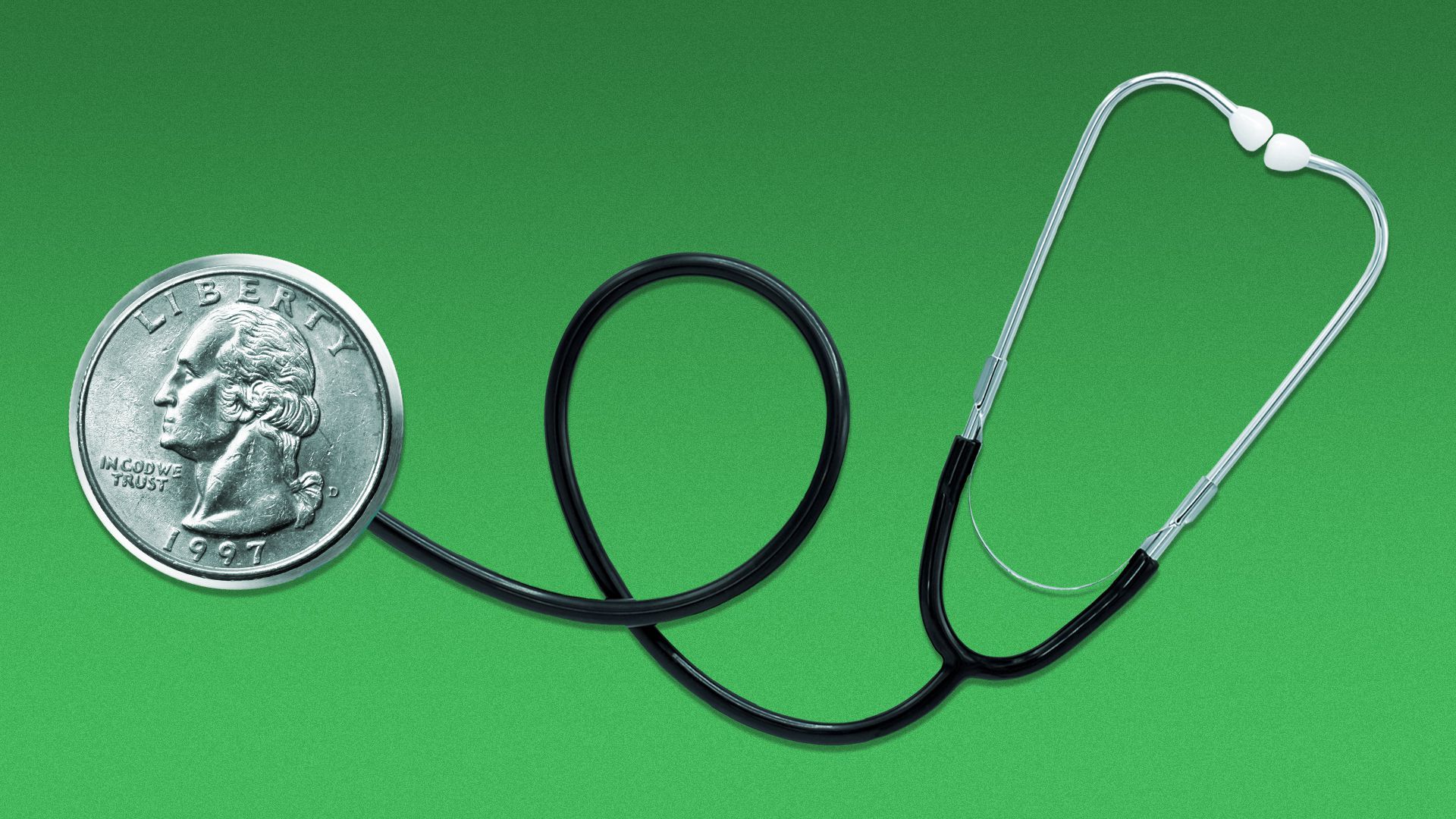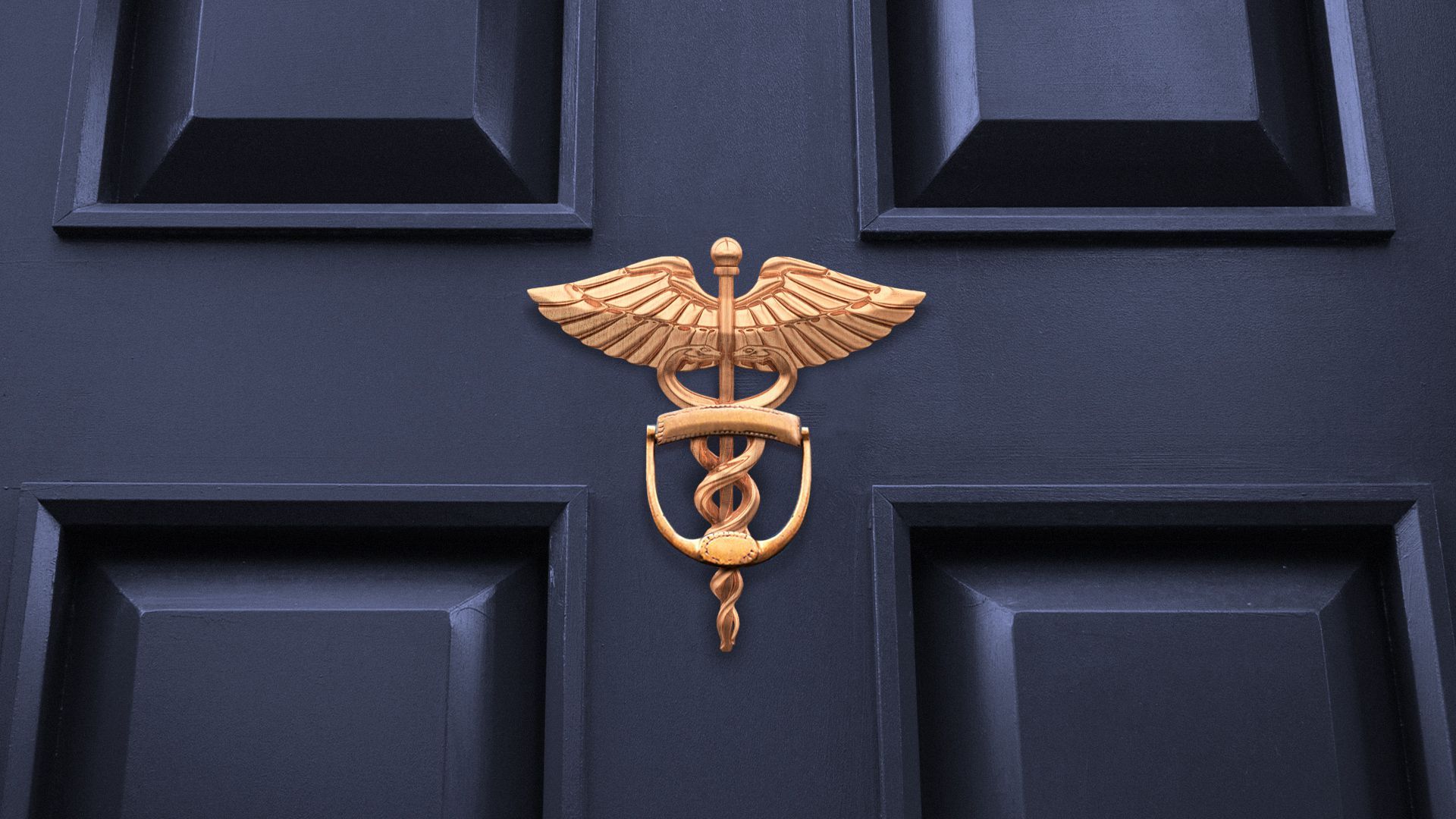| |
| |
| |
| Presented By Blue Cross Blue Shield Association |
| |
| Axios Vitals |
| By Adriel Bettelheim · May 17, 2022 |
| Happy Tuesday, Vitals readers. Tina will be back tomorrow. Today's newsletter is 918 words or a 3-minute read. Situational awareness: The Biden administration is ready to extend the COVID-19 public health emergency, continuing pandemic-era policies as cases continue to rise, Bloomberg reports. |
| |
| |
| 1 big thing: Employers pay hospitals billions more than Medicare |
 |
|
| Illustration: Shoshana Gordon/Axios |
| |
| Employers and private insurance plans in 2020 paid hospitals 224% of what Medicare paid for the same services, with rates for inpatient and outpatient care varying widely from site to site, Axios' Caitlin Owens and I write off a new report from RAND. The intrigue: The report found that hospital prices had no significant correlation with hospitals' share of Medicare and Medicaid patients, which hospitals say factor into private rates. Price did positively correlate with hospital market share. Key findings: Some states like Hawaii, Arkansas and Washington had relative prices below 175% of Medicare prices, while others including Florida, West Virginia and South Carolina had prices at or above 310% of Medicare levels. - In 2020, COVID-19 inpatient hospitalizations averaged 241% of Medicare, which is similar to the relative price for all inpatient procedures.
- Prices for common outpatient services performed in ambulatory surgical centers such as imaging and colonoscopies averaged 162% of Medicare payments. However, Medicare pays ambulatory surgical centers less than it pays hospital outpatient departments for the same services, the study notes, and the ratio would be lower if ambulatory surgical centers were paid the same way.
- If the same providers were paid Medicare rates for the same services, employers and private plans would have saved $49.9 billion, researchers said.
The other side: Hospitals say Medicare reimbursement rates are too low, so they have to charge privately insured patients more to make ends meet. The bottom line: Health costs are likely to keep rising for those with private insurance. The more information about pricing disparities that becomes public, the more likely it is that pressure on hospitals to justify their prices will build. Go deeper. |
    |
| |
| |
| 2. Formula shortage hits hard with imports limited |
 |
|
| Illustration: Maura Losch/Axios |
| |
| Abbott Nutrition on Monday said it reached an agreement with the FDA to reopen a Michigan baby formula plant that was closed due to a recall, paving the way for increased supply amid a nationwide shortage. The big picture: The shortage has cast a spotlight on a tightly concentrated industry, sparking a debate over whether import restrictions, "big bottle" or both set the stage for this crisis, Axios' Nathan Bomey writes. - Four companies — Abbott, Mead Johnson, Perrigo and Nestle — account for more than 87% of the market, according to IBISWorld.
- Parents scrambling to track down formula following the collision of supply chain issues and the massive recall want answers on how this could happen with such a life-critical product.
- Republicans have criticized the FDA for cracking down too hard on Abbott, while Democrats have blasted the industry for lacking competition.
- The FDA says it's moving quickly to lift restrictions on imports to help parents who are struggling to find adequate replacements for their babies.
Abbott said in a statement that it can restart operating the site in two weeks. It will take another six to eight weeks before the baby formula can make its way onto shelves. Go deeper. |
    |
| |
| |
| 3. Seniors see spike in drug-related fatalities |
| Drug-related deaths among adults 65 and older doubled over the course of a decade, with overdoses and misuse of prescription medications from 2018 to 2020 weighing hardest on Black communities, a new report from UnitedHealth Group finds. Why it matters: While adolescents and young adults have received much of the attention as U.S. overdose deaths hit new records, seniors have posted the largest increase in intentional and unintentional deaths compared with other age groups 15 and older, according to the report. Driving the news: Drug deaths among older adults rose from 4.2 per 100,000 to 8.4 per 100,000 between the 2008–2010 timeframe and 2018–2020 per the report. - Drug fatalities among adults ages 65–74 jumped 147% over that interval.
- Black adults were more than 10 times likelier to die as a result of drug use than older Asian adults, and the death rate among males was double that for females.
- Drug-related deaths were highest for older adults in the District of Columbia (49.5 per 100,000) and lowest in Nebraska (3.3 per 100,000).
What the found: Behavioral health measures have generally worsened for older adults, citing frequent mental distress, depression and substance abuse, the report said. |
    |
| |
| |
| A message from Blue Cross Blue Shield Association |
| Addressing the youth mental health crisis |
| |
 |
| |
| Children, teens and young adults are experiencing increasing levels of stress, anxiety and depression. Why it matters: America's youth need a support system that recognizes their mental health needs and gets them immediate access to treatment. See how we're supporting their health. |
| |
| |
| 4. Lowering Medicare age comes at a price |
 |
|
| Illustration: Gabriella Turrisi/Axios |
| |
| Giving Americans over 60 access to Medicare would add about 7.3 million people to the program's rolls and swell the budget deficit by $155 billion over a five-year period, the Congressional Budget Office and Joint Committee on Taxation project said in a new analysis. Why it matters: While it's a popular idea with voters, the big price tag illustrates why Medicare expansion isn't gaining centrist support and remains a legislative long shot. What they're saying: Lowering the eligibility age would result in about 3.2 million fewer people having employer-sponsored health coverage, with most transferring to Medicare. - That would put the federal government on the hook for a larger share of medical spending while lowering per-person spending for work-based health plans.
- The policy would halve the uninsured rate for the newly eligible group, from 8% to 4%.
Flashback: While President Biden didn't initially run on expanding access to Medicare, he agreed to support lowering the age from 65 to 60 in April 2020, when his campaign worked on a unity platform with Sen. Bernie Sanders (I-Vt.). - The idea lost traction as centrists led by Sen. Joe Manchin (D-W.Va.) scaled back Biden's social spending ambitions and the Build Back Better agenda.
|
    |
| |
| |
| 5. Quote du jour |
| "If you look at the history of what the response was during the administration, I think, you know, at best you could say it wasn't optimal." — NIAID director Anthony Fauci, asked on CNN if he would return to his current position if former President Trump were elected again. |
    |
| |
| |
| A message from Blue Cross Blue Shield Association |
| Addressing the youth mental health crisis |
| |
 |
| |
| Children, teens and young adults are experiencing increasing levels of stress, anxiety and depression. Why it matters: America's youth need a support system that recognizes their mental health needs and gets them immediate access to treatment. See how we're supporting their health. |
| |
 | It's called Smart Brevity®. Over 200 orgs use it — in a tool called Axios HQ — to drive productivity with clearer workplace communications. | | |







No comments:
Post a Comment